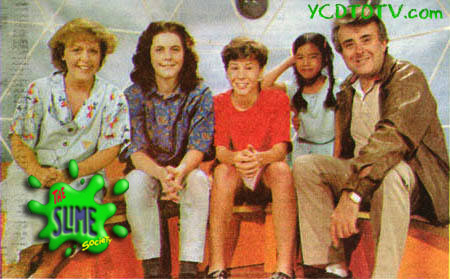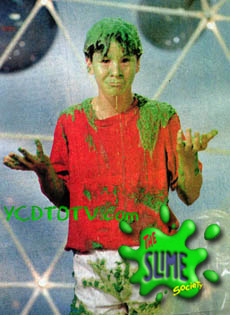
From left to right, Lisa Ruddy, Christine McGlade, Alasdair Gillis, Stephanie Chow, and Roger Price
The Hit TV Show Canada Ignores
You Can't Do That On Television is made in Ottawa with Ottawa talent,
but it's Americans who are watching it
Published in the Ottawa Citizen, 1985
Fourteen-year-old TV host Alasdair Gillis is sucking on a lollipop and trying not to let his gaze stray to the huge box of letters in the next office. Most of them are addressed to him. And they're nearly all from fans in the States - "about 200 a week," he says matter-of-factly.
But hardly any are from Canada, although his show You Can't Do That On Television, made in the CJOH studio in Ottawa, is seen in Canada too.
At school, at St. Pius in Ottawa, though they know he's a TV regular, no on asks for an autograph. In the States, he's something of a TV celebrity.
That morning he had just been talking to USA Today, the million-plus circulation national paper, doing another interview. His publicity files are full of interviews with U.S. teen magazines and TV publications.
 You Can't Do That On Television, the brainchild of writer-producer Roger Price, father of five and an eloquent advocate of kids' rights, is something of a television phenomenon. But not here, mainly on U.S. cable TV (the American name for pay-TV) and specifically on the children's channel, Nickelodeon
You Can't Do That On Television, the brainchild of writer-producer Roger Price, father of five and an eloquent advocate of kids' rights, is something of a television phenomenon. But not here, mainly on U.S. cable TV (the American name for pay-TV) and specifically on the children's channel, Nickelodeon
For anyone looking for further evidence of the old Canadian complaint about having to go the States to make a hit in the entertainment business, the show is a prime exhibit.
You Can't Do That On Television started at CJOH in 1979, and for a couple of years was firmly "Ottawa-ized" (Price's description). It was aimed at an Ottawa audience.
Then U.S. cable TV got interested, and now its "internationalized," which is great for exposure, but has taken away the local color.
Price, who came from Britain to do the show here, is big in children's TV. He produced the top children's show in Britain, Tomorrow's People, and while we were talking took a call from PBC in the States to talk about an hour-long children's movie he is working on.
You Can't Do That On Television, he says, has "an average two Nielsen" rating for cable TV in the U.S., which he explains as reaching two percent of households with television in that country. Dallas, by comparison, has a 30 Nielsen. (In New York a Nickelodeon spokesman would not go into ratings but pointed out Nickelodeon reaches 26 million homes).
As for Canadian viewing figures, Price says he hasn't checked lately. He has heard of a four in Hamilton, and in Ottawa when the show started it was about five to seven percent.
Price does not seem too surprised at the lack of interest here. In Ottawa the show appears at 9 a.m. on Saturdays. In the States, it gets shown for two half-hours daily, at 4 and 7 p.m. He offers the schedule with a wry grin.
So why is You Can't Do That, with its basic skit format, raw juvenile humor, wacky sketches and surprisingly low budget (around $40,000-$50,000 a show), so successful on cable TV?
Price is academic on that point. "Nearly all television for kids starts form the premise how can we educate them or improve them, or stop them from being the people they want to be, and make them the people we want to be. I want a show they find entertaining and which makes them feel better about themselves."
In other words - fun, like dollops of green slime, one of the show's trademarks.
Pause here to go downstairs to catch up on the skit Price has been watching on a monitor while phoning in corrections like "tell Vanessa (one of the children on the show) not to call it a 'station.' Americans call it a studio."
In the chilly studio, standing on a plastic sheet, 12-year-old Dougie Ptolemy is wearing baggy shorts, stick-on styrofoam angel wings and a curly blond wig, and trying hard not to look up at the bucket a studiohand is dangling over his head.
Dougie has just used the trigger phrase "I don't know" after a dressing-down from the show's regular male adult symbol, Les Lye. Like a sinner on the scaffold, he is waiting for retribution.
Because this is television, there's a pause while a director does a countdown, "five, four, three ..." Then, Whoosh.
The slime is day-glow green, and plentiful. Apart from shampoo no one knows what it contains. It happens twice a show, and, Price assure the watcher, is harmless. Besides, he adds, they pay the victim an extra $50 each sloshing, "for the inconvenience."
Back upstairs Price, who is simultaneously working on another production for cable TV, called Turkey Television, which is being made partly in Ottawa, Toronto, New York and Louisville, Ky., talks about where he gets his players.
They're all from Ottawa schools. "If they'd been brought up in Hollywood, they'd all be big stars by now." Price obviously means it, but cringes at the suggestion of any 'stars' in his show.
What he wants from his performers is the right kind of parents. These he defines as "allowing no compromise in wanting what is best for their child, and supporting them in every endeavor."
What he gets from his team of 12 is enthusiasm, the kind you give up school vacations for.
They come mainly from after-school drama classes run by CJOH and the Ottawa Board of Education, a couple came from the Ottawa Children's Theatre and one by writing to Price and persuading him that he was right for the part.
They are replaced when they get "horrendously large." That doesn't necessarily mean physical stature, or even age, one is left to assume, but something to do with egos.
In Gillis' case, he hints, it might have something to do with his feet, which are now size 11. (asked about this, Gillis insists they are actually 9 1/2).
Gillis, he recalls, saw the cast together at a local restaurant one day when he was 10 and decided that's what he wanted to do. One year later, he belonged. The season is his first as host.
By now Alasdair Gillis is quite sure that entertainment is going to be his career. At 14, he is polite, self-assured and unfazed by fan-mag questions like "What kind of girls do you like?" (Answer: "Someone with a good sense of humor, who's fun to be with."
Price only has one problem with him: "He's hard for me to write for, in some ways, because he's such a nice kid. Comedy comes from having shortcomings, you know, but he doesn't have very many.